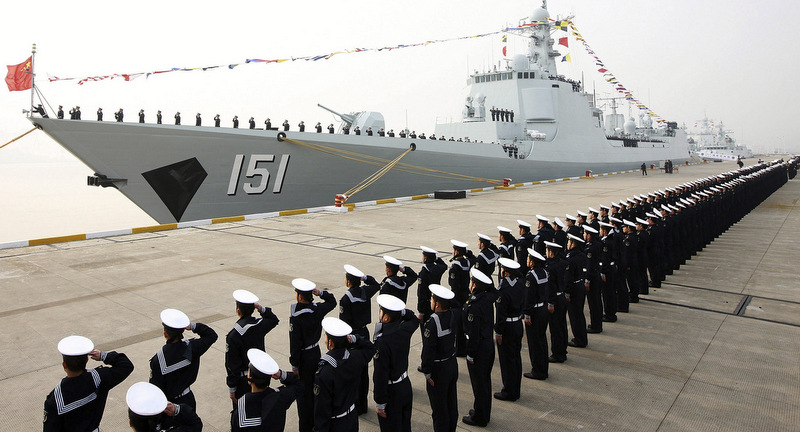
The Chinese government plans to increase its defense budget to $132 billion in 2014, according to an announcement made this week. The budget marks a 12.2-percent increase year on year, according to various sources.
China’s state-run Xinhua News Agency cited a draft budget report submitted for review on March 5, confirming rumors that the Chinese Communist Party was planning to boost its military spending. Outside analysts typically assume the official numbers underestimate true spending.
The increase follows a trend of almost annual double-digit increases in China’s defense spending for the last two decades. The increased spending for 2014 is comparatively lower than some years, including 2008, 2007, 2002 and 2001, which saw year-on-year increases of 17 percent or more. In 2013, China spent $114 billion on its military budget, according to GlobalSecurity.org.
Regardless, the continued pattern has China’s neighbors concerned, especially amid escalating territorial disputes.
In response to China’s increases, Taiwan’s Democratic Progressive Party was already urging the government to increase its military spending to 3 percent of its GDP on March 4.
Referring to China, Japanese Prime Minister Shinzo Abe said in January, “year after year they have been increasing their defense spending by 10 percent. They have done this for the past 20 years. And this is a source of concern for the countries in Asia as well as for Japan.”
There is a fine tinge of irony to China’s announcement, given that Chinese leaders criticized Japan in December 2013, when Japan announced a 5-percent increase to its $59 billion defense budget over the following five years.
Chinese leaders said Japan was using regional tensions as an excuse to build up its military, according to Japan Daily Press.
After Japan announced its budget, China’s Foreign Ministry spokeswoman Hua Chunying said her country would be watching Japan closely, claiming China had “no alternative but to be on high alert over Japan,” Japan Daily Press reported. She added that Japan should honor the security concerns of other countries and “stick to the path of peaceful development.”
Chinese leaders have played different lines on their much larger — and continued — increase in defense spending, however.
“In order to protect the country and safeguard regional peace and stability, China has to enhance its national defense,” said Chen Zhou, a deputy of China’s National People’s Congress, reported China Daily, a state-owned newspaper.
The line to protect “regional peace and stability” is commonly used by Chinese officials to excuse their increasingly heavy-handed methods of trying to grab disputed territories.
While China has shown large and regular increases in its defense spending over the years, the real concern is what Chinese leaders are not announcing.
“Chinese media reports tend to summarily dismiss reasonable foreign (and some domestic) concerns about Beijing’s limited defense spending transparency and rapid military development, failing to recognize both the potential threat that China’s increasingly capable military poses to its neighbors and the fact that these neighbors have legitimate rights and interests of their own,” said Andrew Erickson of the Naval War College in a Jan. 30 congressional hearing.
Erickson noted that China’s announced military budgets do not align with its military spending.
The Pentagon believes China’s actual defense spending is much higher than what it discloses publicly, according to Agence France-Presse. In 2012, for example, China reported its defense budget at $106 billion, yet the Pentagon believed the actual budget was between $135 billion and $215 billion.
Japan has expressed similar concerns. Following China’s announcement, Chief Cabinet Secretary Yoshihide Suga told reporters, according to Defense News, “the transparency of China’s defense policy and military capacity, or lack thereof, has become a matter of concern for the international community, including Japan.”
China has the second largest defense budget in the world, second only to the U.S.
“Foreign military analysts say China’s actual annual military spending is higher than the official figure,” The New York Times reported on Wednesday. “IHS Jane’s, a defense industry consulting and analysis company, estimated that China would spend $148 billion this year, but such estimates can vary widely. The unofficial estimate is still much less than the military budget of the United States, which is officially $526.8 billion for fiscal year 2014.”
However, even after downsizing and decreasing military deployments abroad, the U.S. still holds a substantial advantage over China’s military.
The move to increase their defense budget comes on the heels of an incident last November, when China claimed a new “Air Defense Identification Zone” over a swath of the East China Sea, saying that foreign planes — both military and civilian — would be required to report flight paths through the zone to the Chinese government. The U.S. has ignored the announcement to date and has continued to send military flights through the zone. The zone, however, also affects Korean and Japanese flight paths, making for a tense situation in the region.
Furthermore, Japan and China have been engaged in an extended dispute over the sovereignty of a chain of islands in the East China Sea, known as the Senkaku in Japan and the Diaoyu in China, that fall under Japanese administration. Analysts worry that routine military patrols and movements by fishing vessels around those islands from either China or Japan could set off a conflict.

